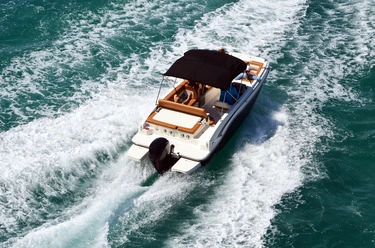
With its extensive coastlines and beautiful waterways, Florida is a haven for boating enthusiasts.
However, the high volume of boat traffic on these waters means accidents are bound to happen. It’s crucial to understand Florida’s boating accident laws and your rights in the event of an accident.
Florida’s boating laws outline responsibilities, liabilities, and subsequent actions. Whether you’re seeking information due to a recent encounter or want to be prepared, knowing these laws can empower you to make informed decisions and safeguard your rights.
If you have questions about your rights and obligations in a Florida boating accident, please get in touch with Johns Law Group, PLLC.
Important Florida Boating Laws to Know
Navigating Florida’s waters requires more than just a keen sense of direction; you need a clear understanding of the boating laws in place to ensure safety for all.
Below, you’ll find some of the most important boating rules every boat operator and passenger should know.
Boating Under the Influence (BUI)
Like driving a car, operating a boat under the influence of alcohol or drugs is strictly prohibited in Florida.
Someone with a Blood Alcohol Content (BAC) of .08 or higher is presumed intoxicated. Not only does this place the boat operator in potential legal jeopardy, but the risks associated with intoxicated boating can be fatal.
Avoid boating under the influence altogether. If you suspect the operator might be intoxicated, it’s in your best interest to avoid boarding the vessel.
Mandatory Accident Reporting
Florida’s boating laws make it mandatory for boat operators involved in accidents to report them under certain circumstances. These include situations where:
- Injuries necessitate more than first aid,
- Property damage exceeds $2,000, or
- There’s a disappearance or death.
Failure to report an accident can result in criminal penalties. Moreover, if a victim’s condition deteriorates due to delayed medical attention resulting from a failure to report the accident, the boat operator could be held responsible for the victim’s exacerbated condition.
Always report accidents promptly. If you witness an accident, it’s prudent to report it even if you weren’t directly involved.
Boat Registration Requirement
Much like vehicles on the road, all boats on Florida’s waters must be registered. This registration gives each vessel a distinct number, which must be prominently displayed on the boat.
In the unfortunate event of an accident, this number acts similarly to a vehicle’s license plate, allowing for easy identification. If you find yourself in an accident, try to note down the registration number of the other boat involved.
Adherence to Posted Speed Limits
Just as roads have speed limits, so do Florida’s boating lanes. Exceeding these can result not only in injuries but can also lead to legal liabilities and criminal charges. Always operate a boat within the legal speed limits. As a passenger, you must also ensure the operator adheres to these limits.
Staying informed about these boating laws in Florida is not just about legal compliance—it’s about ensuring a safe and enjoyable experience on the water for everyone involved.
Types of Boating Collisions
Collisions while boating fall into two primary types—those involving other boats and those that don’t.
Collisions Between Boats
When two boats collide, determining responsibility can be complicated. A boat operator failing to exercise reasonable care can lead to a collision. Florida’s boating rules might dictate specific rights of way that every operator is expected to know.
Injured passengers can typically pursue compensation against any negligent boat operator, including against the operator of the boat they are a passenger in.
Collisions Involving Waves or Wakes and Submerged Objects
Not all boat collisions involve another vessel. Sometimes, the wake of another boat can be the primary cause.
Boat operators must anticipate and respond to potential hazards, including waves or significant wakes. Liability in these accidents hinges on various factors:
- Boat traffic,
- Warning given to passengers,
- The boat type,
- Wake size,
- Boat speed, and
- Overall visibility.
Operators who create wakes in designated ‘no wake’ zones—especially in specific marinas and harbors—can be deemed negligent. The affected boat’s operator could also be liable if they failed to warn or protect passengers.
Large waves pose another challenge. While a boat operator could be negligent if a wave adversely impacts their boat, there are instances where no one is negligent because of the inherent unpredictability of the sea.
Lastly, submerged objects such as rocks, reefs, or debris can pose a significant threat. If a boat operator uses nautical charts and exercises all safety precautions, a collision with such an object might not necessarily lead to the boat operator’s liability.
Knowledge of these nuances in boating collisions is vital. Whether you’re an operator or a passenger wanting to understand your rights, awareness about these scenarios under Florida’s boating laws can make all the difference.
Safety Equipment Required on Boats
Part of Florida’s boating laws include having the proper safety equipment. The requirements vary by vessel category.
For example, for Class A recreational boats, which are less than 16 feet in length (including canoes and kayaks), the following safety equipment is mandatory:
- Approved Personal Flotation Device (PFD) for every individual on or those being towed on water skis and similar activities (inflatable PFDs prohibited);
- Everyone under the age of six must wear an approved PFD while the boat is underway;
- Appropriate type and size fire extinguisher(s);
- Visual distress signals when on the high sea and coastal waters and also for nighttime boating;
- Sound-producing devices such as horns, whistles, or bells;
- Backfire flame control mechanisms;
- An effective ventilation system; and
- Proper boat lighting equipment.
An operator’s negligence isn’t only based on their actions but also their preparedness. The absence of mandated safety equipment can lead to severe consequences during accidents, often worsening the injuries.
If an operator fails to equip their boat with state-required safety gear, they may face liability for exacerbated injuries or damages. That is particularly true if the injured victim can prove that the presence of such equipment could have mitigated the extent of injuries or damages.
Contact a Florida Boating Accident Lawyer
Boating accidents in Florida involve a complex mix of maritime and state laws, each with nuances.
Determining which law applies is critical and can significantly influence the outcome of a case. General maritime law takes precedence for accidents on navigable waters, while incidents on non-navigable waters fall under Florida’s state laws.
Understanding the differences and how boating accident laws influence liability is paramount.
For instance, was a potentially dangerous condition adequately marked? Did someone breach a navigational statute? Such violations can be deemed “negligence per se,” automatically establishing the offending party’s negligence.
If you have questions about your rights under boating rules in Florida, contact Johns Law Group, PLLC. We have significant experience with maritime and state boating laws. Our dedicated team will help you understand your legal rights and obligations.

